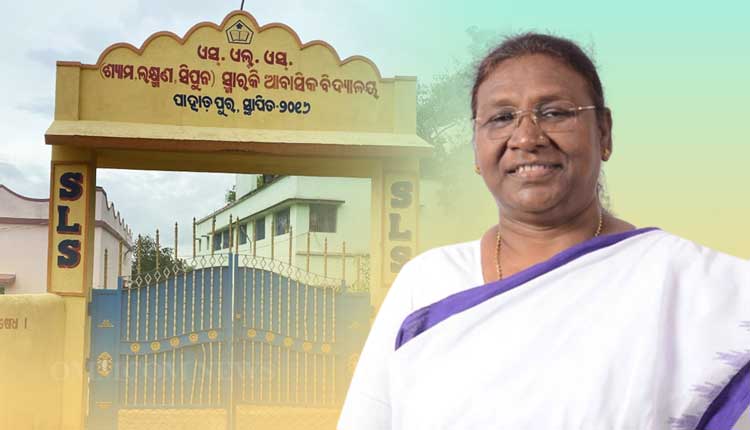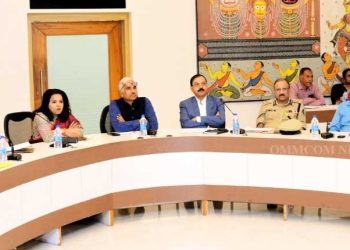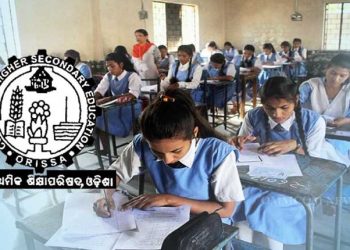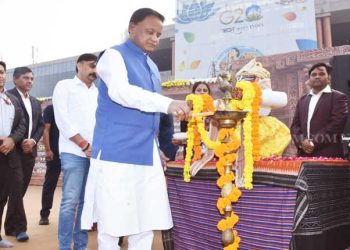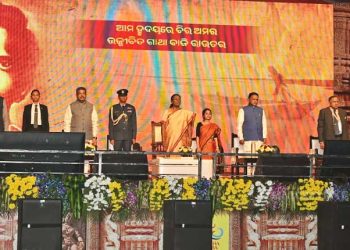Bhubaneswar: Prime Minister Narendra Modi will launch 5G Services in India on Saturday. According to reports, the SLS Residential School founded by President Droupadi Murmu at Pahadpur, her late husband’s village, in Odisha’s Mayurbhanj district is likely to be a part of the launch of 5G service in India on Saturday.
President Murmu had converted her in-laws’ ancestral house into a residential school in memory of her husband Shyam Charan Murmu, elder son Laxman Murmu and younger son Sipun Murmu, who passed away due to different reasons between 2009 and 2014.
The residential school run by President Murmu will be one of the venues for the live demonstration of 5G services, sources said.
The PM will also inaugurate the 6th Edition of India Mobile Congress 2022 (IMC-2022) to be held from October 1-4, 2022, at Pragati Maidan, New Delhi.
State IT Secretaries have also been invited to the IMC-2022 and a roundtable conference with State IT Ministers is also planned during the IMC-2022 to discuss with them about the role of States and UTs in the rollout of 5G, business opportunities, need for skill development and for interaction with potential start-ups and investors.
The launch of 5G services follows years of intense preparation. Recently, 5G spectrum auctions were conducted successfully and 51,236 MHz was allocated to Telecom Service Providers with a gross revenue of Rs. 1,50,173 Crores.
The auction aggregated the demand for a robust 5G ecosystem that can cater to its use cases involving IoT, M2M, AI, Edge Computing, Robotics etc.
5G can unleash new economic opportunities and societal benefits giving it the potential for being a transformational force for Indian society.
It will help the country leapfrog the traditional barriers to development, spur innovations by startups and business enterprises as well as advance the ‘Digital India’ vision. The cumulative economic impact of 5G on India is expected to reach $450 Billion by 2035.
DoT has amended Right of Way (RoW) Rules 2016 in August 2022, wherein the charges for RoW permissions have been made reasonable and a ceiling for RoW charges for installation of 5G small cells and optical fibre cable on street furniture has been fixed.
DoT has set up a 5G Testbed with help of IITs, IISc Bengaluru and SAMEER to develop technology in 2018. A 5G Hackathon was commenced in 2020, to trigger ideation and prototyping of use-cases by startups and has led to spurring innovative products.
An inter-ministerial committee on 5G use-cases has been functioning since 2021 in coordination with 12 Central Ministries, enabling setting up of 5G use-case labs. Consultations with Industry have been held enabling the 5G ecosystem to make 5G handsets available. A roundtable was held in Mumbai with Investors, Bankers and Industry on 5G Business opportunities and to identify key interventions by the Government.
C-DOT has developed an indigenous 5G Non-Stand Alone (NSA) core. C-DOT is also developing 5G Radio Access Network (RAN) in collaboration with local industry and start-ups. C-DOT has already tested its 4G Core in collaboration with TCS and Tejas Networks successfully.
All these will help in answering the Prime Minister’s clarion call on “Jai Anusandhan”. All these efforts are game-changers for India’s manufacturing and Telecom ecosystem leading to domestic 5G enterprise carrier grade stacks as well as innovative impactful 5G use-cases.
The 5G to be launched by the Prime Minister in select cities will progressively cover the entire country over the next couple of years.
The theme of the IMC-2022, the leading digital event in Asia is ‘Encapsulate, Engage and Experience a New Digital Universe’ and has the main objective of promoting new technologies, particularly the indigenous ones and letting Citizens experience the usages and applications of 5G.



